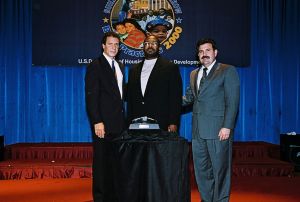 |
2000 Best Practice Awards
Best of the Best Winners: Washington
Best Practice: Housing at Sand Point
The redevelopment of a former Naval Station
that will result in 200 units of transitional housing for the homeless
Sand Point, Washington. The city of Seattle estimates that on any given day
there are 5,500 homeless persons in the Seattle and Kent County region,
of which 2,500 are homeless youth, teen mothers and families. As a result
of a three-year reuse planning process, many of them will have a safe and
healthy home while they learn needed skills to help them become self-sufficient.
Neighborhood groups, civic organizations and
homeless service providers developed the plan, which called for the redevelopment
of the 151-acre Sand Point Naval Station, which the U.S. Navy decommissioned |

Darwin Anderson (c) receiving Best of the
Best award from Secretary Cuomo (l) and Deputy Secretary Ramirez (r) |
in the mid-1990s. The property was transferred
to the city for the purpose of providing housing, supportive services and
employment opportunities for the homeless.
The Sand Point Community Housing Association,
under a master lease with the city, has overseen the redevelopment of the
former naval station, which will result in 200 units of transitional housing
for the homeless. The first phase, which was completed in early 2000, includes
the following components:
- 26 units for families with children, which
will be managed by the housing association;
- 6 units for mothers and their children,
8 units for youth aged 16-18, and 8 units for youth aged 18-21, all managed
by Friends of Youth and Youthcare; and
- 41 units for single men and women, which
will be managed by the Low Income Housing Institute.
Through HUD’s McKinney Act Program, the
city has provided in excess of $5 million to the project. Multiple nonprofit
organizations are involved in the actual management of the various projects
and provision of a wide range of supportive services to residents. The groups
include the Catholic
Services, the Church Council of Greater Seattle,
El Centro de la Raza, the Salvation Army, the Seattle Conservation Corporation
and the Private Industry Corporation.
Contact: Tom Byers, Phone: (206) 684-8105
Tracking Number: 2794
Winning Category: Geographic |
Best Practice: Cultivating Communities
Agricultural Enterprises Springing up
in Seattle's Urban Communities
Seattle, Washington. For Asian and
African immigrants in Seattle’s public housing, growing produce for
purchase allows them to feel connected to their neighbors and adjust to
an unfamiliar language and environment while maintaining a semblance of
self-sufficiency. Participation in the Cultivating Communities program,
a community-supported agriculture enterprise, helps residents—many
of whom are from Eritrea, Ethiopia, Cambodia, Somalia, Laos and Vietnam—
feed their families and supplement their often extremely limited income.
Cultivating Communities is an outgrowth of
a community gardens program begun in 1995 to fulfill a need identified by
public housing residents for clean gardening sites. (Much of the soil around
the World War II era buildings is contaminated with high levels of lead.
As a result, residents cannot grow food next to their units.) The program
operates three market gardens in three of Seattle Housing Authority’s
(SHA) large public housing garden communities. Involved in the program are
two sets of participants: the public housing residents who grow the organic
produce in each of the market gardens and the subscribers from around Seattle
who purchase a summer’s worth of fresh, local vegetables from their
public housing neighbors.
Subscribers pay $350 per season and receive
a large bag of fresh vegetables each week during the growing season from
mid-May to Mid-October. They can pick up their vegetables at the garden
and meet the gardeners or take advantage of pick up sites at local churches.
Each gardener is responsible for at least
one garden plot (a minimum of 10’ x 40’) and commits to working
in the garden every day during the growing season and participating
in weekly governance meetings with
the other growers. Each garden has its own
character, reflecting the spirit of the community in which it is located.
The terraces of the “Rainier Vista Sunrise Garden” overlook Mt.
Rainier. At “the Most Abundant Garden Project,” the beautiful
bamboo fences and trellises surround the garden plots and colorful banners
wave in the breeze. A local artist who had traveled widely in Asia and a
Cambodian public housing resident built the fences.
Cultivating Communities is a partnership between
the Friends of P-Patch (FPP), the City of Seattle and the SHA. FPP provides
direction and fiscal management and seeks funding. The city provides office
space and program supervision. SHA supplies land and materials and services
for garden construction and operation. The program is also a collaboration
with a wide variety of agencies and community associations. Local churches
and neighborhood councils identify subscribers. Other partners include the
King Conservation District, Rainier Vista Leadership Team, and the High
Point and Holly Park community councils.
Together, residents, agencies and associations
are transforming spaces that were once littered with garbage and drug paraphernalia
into vibrant community gathering spots. Market gardens have generated approximately
$30,000 in produce sales, provide fresh organic produce to 40 public housing
households and provide each family an average supplemental income of $500
annually. A total of 150 families have subscribed and developed personal
relationships with the gardeners through potlucks and regular garden visits.
Gardeners have developed friendships and share gardening tips and recipes
with other gardeners from their native countries and from around the world.
Contact: Martha Goodlett, Phone: (206) 978-6372
Tracking Number: 2973
Winning Category: Program (Public and Indian Housing)
Return to Best
Practices 2000 Best of the Best Winners
Content Archived: April 20, 2011 |